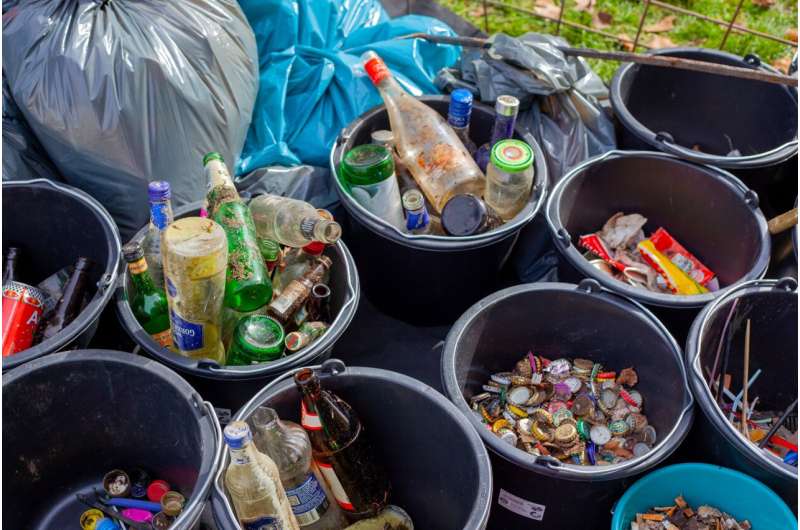Impact of China’s National Sword policy on the US landfill and plastics recycling industry

University at Buffalo researchers have published a study quantifying how a series of regulations limiting the import of plastic waste to China has affected recycling in the United States.
Described in Sustainability, “Impact of China’s National Sword Policy on the U.S. Landfill and Plastics Recycling Industry” analyzes the impacts of China’s Green Fence and National Sword programs. Both imposed strict contamination limits on recyclable materials, and, after National Sword, the landfilling of scrap plastic in the U.S. increased.
The study was led by Aditya Vedantam, assistant professor in operations management and strategy, Nallan C. Suresh, UB Distinguished Professor in operations management and strategy, and Khadija Ajmal, a doctoral student, all in the UB School of Management; and Michael Shelly, an environmental/ecological economist at UB’s RENEW Institute.
In 2013, China introduced Green Fence, a program which involved intensive inspections of incoming loads of scrap material. In 2016, China announced restrictions for secondary material commodity imports from the U.S. The following year, China launched its National Sword program, which imposed strict contamination limits on recyclable materials. Finally, in 2018, China introduced a 0.5% contamination limit along with a ban on many recyclables, including plastics.
Before these restrictions, the U.S. shipped most of its plastic scrap overseas, particularly to China.
Controlling for oil prices, producer price index and amount of plastic scrap exported, the researchers found that Green Fence had no statistically significant impact on the amount of plastic landfilled in the U.S. However, the quantity of plastic landfilled in the U.S. increased by 23.2% following the implementation of National Sword.
“With waste generation consistently growing, coupled with fewer options to export plastic scrap, the domestic supply of lower value plastic scrap has drastically exceeded existing demand. This has resulted in a decline in prices, which reduced the profitability of recycling and increased the attractiveness of alternate disposal options, such as landfills,” says Vedantam.
To gauge how National Sword affected plastics recycling in New York State, the researchers created a database of information obtained from annual reports submitted by registered material recovery facilities (MRF) to the state’s Department of Environmental Conservation (DEC). Researchers also interviewed MRF operators in New York and other industry experts.
“Analysis of data showed that even though China’s restrictions led to an increased amount of incoming material at MRFs in New York, the amount of plastics recovered still went down, consistent with national trends,” says Vedantam.
“The study shows that following China’s National Sword policy, the amount of plastic recycled in the U.S. has significantly declined. Meanwhile, the amount of plastic that is landfilled in the U.S has increased. This underlines the importance of improving domestic plastic recyclability, recycling rates and reducing contamination,” says project director Amit Goyal, SUNY Distinguished Professor and SUNY Empire Innovation Professor at in the Department of Chemical and Biological Engineering at UB.
The study is part of a multidisciplinary project directed by Goyal and sponsored by New York’s Environmental Protection Fund and the DEC.
“Another part of this multidisciplinary project focuses on using human behavioral science and outreach/education to help develop initiatives to understand and address consumer confusion about recycling. This work is important to determine how to understand decision making, improve messaging and reduce contamination at the recycling bin,” says Goyal.
While interviewing MRF operators and industry experts, the researchers discovered that most MRFs’ costs increased as they improved the quality of materials sorted and met contamination standards.
“For example, one MRF we spoke with had to increase the number of sorters and slow down its sorting line by 40% to improve the quality of their sorted plastics and paper, leading to a doubling of operating cost,” says Vedantam.
Ultimately, the previous model of relying on exports to solve the problem of recycling plastic scrap is no longer viable in the U.S., he says.
“China’s restrictions have highlighted the need to invest in and improve recycling in the U.S. Sophisticated machinery and a sufficient supply of materials are available. Still, due to low market prices of plastics—particularly, the mixed Nos. 3–7 plastics—there is little incentive to invest in expanded and improved plastics recycling,” Vedantam says.
“This work highlights that there is a pressing need for industry organizations and policymakers to encourage demand creation for scrap plastic and improve the quality of recyclables,” says Vedantam.
Such efforts are underway. For example, the Polypropylene Recycling Coalition and U.S. Plastics Pact are voluntary initiatives where industry has committed to using recycled materials.
Additionally, New York Gov. Kathy Hochul has proposed an extended producer responsibility program that will encourage producers to invest in recycling infrastructure, make products that are easier to recycle and encourage alternatives that are more in line with the circular economy. If adopted, this proposed approach aims to build on the progress of current laws and initiatives that support recycling and reduce contamination in the recycling stream.
Further, human behavioral science and outreach/education initiatives such as the Recycle Right NY campaign are being employed to decrease contamination and improve recycling in New York State.
“A comprehensive regulatory solution may be needed in the U.S., perhaps on the scale of the European Union’s circular economy package, to support recycling and help turn the tide on plastic pollution,” Vedantam says.
Aditya Vedantam et al, Impact of China’s National Sword Policy on the U.S. Landfill and Plastics Recycling Industry, Sustainability (2022). DOI: 10.3390/su14042456
Citation:
Impact of China’s National Sword policy on the US landfill and plastics recycling industry (2022, March 30)
retrieved 30 March 2022
from https://techxplore.com/news/2022-03-impact-china-national-sword-policy.html
This document is subject to copyright. Apart from any fair dealing for the purpose of private study or research, no
part may be reproduced without the written permission. The content is provided for information purposes only.
For all the latest Technology News Click Here
For the latest news and updates, follow us on Google News.
